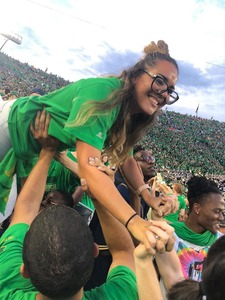A self-described history nerd, Jacquelyn Aguirre studies what she loves at Notre Dame. The history and Spanish double major is working on a capstone project that explores slavery in 19th-century Cuba. She’s a passionate student whose cultural heritage is important to her and she’s using her Notre Dame education to explore other cultures too. Below, she gives details on why she chose her majors, where she studied abroad, and she offers some advice to prospective Notre Dame students.
Major: History, Spanish
Minor: Constitutional Studies
Hometown: Kansas City, Missouri
Clubs and campus involvement: Resident advisor, Badin Hall; involved in all things Badin from Sunday Mass to dances to movie nights; tour guide for the Office of Undergraduate Admissions
Why did you choose to double major in history and Spanish?
I’ve always been a huge history nerd—it was a special way for my dad and I to connect and spend time together and I fell in love with it. For me, it only made sense to study what I loved, and I loved history. As for Spanish, I’m a fourth-generation immigrant. My great-grandparents arrived here from Mexico around 1916—I’m extremely proud of my culture and heritage, but far enough removed that I never grew up speaking Spanish. This major was a great opportunity to get back to my cultural roots. I didn’t actually declare Spanish as a major until the end of my first year here, after my first Spanish class. I was already in love with the language, but I really came to love the department and professors as well.
Tell us about your research.
 Jacquelyn Aguirre goes up for push-ups at a Notre Dame football game.
Jacquelyn Aguirre goes up for push-ups at a Notre Dame football game.
I’m writing my capstone for my Spanish major right now—basically a 25 page Spanish paper on a topic of my choosing—on the link between slavery and the sexualization of women of color in 19th-century Cuba. It’s really interesting and combines Spanish and History, so I’m really enjoying it. I’ve always thought it was interesting that women of color are so often oppressed and look down upon historically speaking and at the same time taken advantage of—I wanted to know why and this project is really helping me with that.
Have you studied abroad?
I studied abroad spring semester of 2018 in Athens, Greece. Most of the classes I took were for my history major—my concentration in history is Alexander the Great, so I was really geeking out—and a few constitutional studies classes as well, mostly about immigration and politics in Greece and Europe.
What do you plan to do after graduation?
Right now, the plan is to take a gap year, get a job in a law firm, do some volunteer work, and potentially spend a few months in Mexico with my family to hone my Spanish. After that, I’ll, hopefully, be heading to law school to study immigration law.
Do you have any advice for prospective students?
My general advice is to be yourself. My application was not the strongest numerically speaking but, luckily, Notre Dame didn’t just look at my statistics. I really poured my heart into my essays, and I think that really came through. Give the admissions team a chance to get to know you; really show them who you are beyond your numbers.
How about advice for incoming first-year students?
In terms of choosing a major: It can be hard. I often get asked what exactly I plan to do with a history degree and the answer is: Anything I want. Science and math and business are so important, but so are the liberal arts. Study what you love. If you love theater or history or philosophy, pursue that. Don’t let anyone tell you that you’ll never be able to make a living with that—you can and you will and you’ll enjoy your college experience much more if you love what you’re learning.
Also, Don’t be afraid to try. If I have any regrets from my time here at Notre Dame, it’s not putting myself out there more, applying for more grants and volunteer opportunities and research. Reach for the stars; this is the best time in your life to fail—you’ll get back up and you’ll be better for it.
Originally published by at admissions.nd.edu on January 10, 2019.